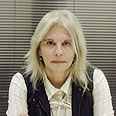
Smadar Peri
Photo: Gabi Menashe
Yousra, the queen of the silver screen in the Arab world, is not only a beauty but also a highly opinionated actress who views her status as a springboard for conveying social messages. Every year during the Ramadan fast, the peak season for TV viewing in the Arab world, Yousra pushes urgent social issues to the forefront.
This is what happened two years ago, with a reality show about a single mother's uncompromising struggle against a conservative and chauvinist society; the same goes for "The Yacoubian Building," which has its say about the polygamy prevalent in Arab high society.
Every such series, 30 consecutive episodes broadcasted nightly while families get together to break the fast, turns into a heated dispute. A year ago Yousra was appointed an ambassador of goodwill by UNESCO, which was a boost of encouragement for her persistence.
"A Case of Public Opinion," the latest Ramadan series, has become the talk of the town even before being aired in 22 Arab countries. Ratings are sky high; no one dares miss the show. This time the queen of the screen from Cairo chose to focus on a topic that Arab society has insisted on burying deep underground: Violent rape and sexual abuse.
The series recounts the story of three young female doctors who work in a respectable hospital in the heart of Cairo; the three are summoned in the middle of the night to treat an urgent case. As they race to the destination from a remote neighborhood, drugged thugs pounce on them from behind the shadows. They are attacked and raped, including the doctor whose pregnancy is very obvious. They weep, cut and bruised, while three knife cuts are evident on the cheek of the department head, portrayed by Yousra.
Ahead of the broadcasts, one of the human rights organizations in Egypt held a referendum among tens of thousands of women. The findings were shocking: 40 percent of respondents admitted that they had been raped and forced to remain silent. An additional 10 percent revealed that they are forced to deal with sexual harassment in the workplace. If they open their mouths, they will lose their jobs.
In a "Case of Public Opinion", the marriage of the star doctor is falling apart. Her husband insists on ignoring the facts, and the legal authorities remove the complaint against one of the rapists, the son of a senior government minister. Even the fate of her two colleagues plays against them, when the hospital director hints that "if they don't shut up, they will be fired."
The rape scene was not aired in full on Egyptian TV. The censorship left just subtle hints, arguing that the harsh images may shock young viewers. On the other hand, Dubai TV went for lock, stock and barrel; 15 minutes that left no room for imagination. As expected a dispute was immediately aroused: Was it appropriate to share the experiences of the group rape with viewers?
Shaking up traditional family structure
This is undoubtedly a "women's year" throughout the Arab world. In Saudi Arabia they are finally being allowed to drive, with the blessing of the royal family. In Morocco and Tunisia women are now permitted to file for divorce. In the oil Emirates women's organizations are calling for equal rights, and the regime is expanding employment opportunities. In Jordan murders committed in the name of "family honor" are treated harshly.Yet throughout this entire voyage, which is shaking up the traditional family structure, the issue of sexual harassment and rape remains within the realm of a "red rag." Women who find the courage to complain are accused of "starting it" or told they "should not have been walking around alone." Also, "those who don't wear a veil are entitled to be defiled."
Decorated with a host of international awards as well as an impressive screen, theater and TV career behind her, Yousra pledges to keep going. Female attorneys have been hired in recent days to file cases of harassment, and internet blogs reveal chilling accounts by women who have been raped.
The authorities have yet to decide how to deal with this new social phenomenon. A quick glance at the headlines of criminal law sections run stories from the global media (including ours,) to find solace in the fact that they are not alone.















